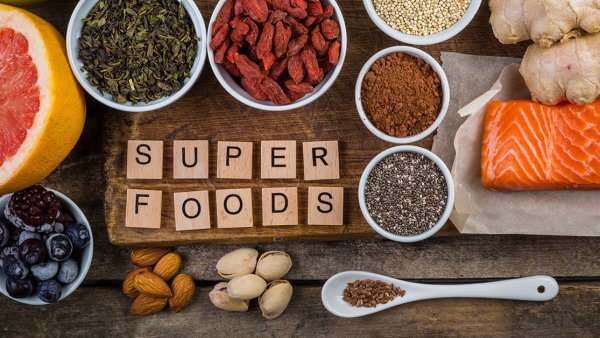~ by Carol Vartuli
Millions of people find cookies, chocolate cream pie, and jelly beans super delicious, but most people know they're not nutritious foods.
A wide variety of foods contain essential nutrients for human life and health, yet there is a super class of foods that "offer high levels of desirable nutrients, are linked to the prevention of a disease, or believed to offer several simultaneous health benefits beyond their nutritional value." (Harvard Public School of Health)
Those are superfoods.
Not a New Concept
The idea of a superfood likely originated in the early 20th century, around World War I. After the American Medical Association reported that bananas had an ability to relieve, or even cure Celiac disease, the United Fruit Company enhanced its marketing of bananas-- and no doubt its quantity of imports.
Unfortunately, the medical community's advice about bananas’ super benefits was withdrawn by further research. Although bananas have health benefits, the then as-yet undiscovered culprit in Celiac disease turned out to be gluten.
21st Century
Today, burgeoning scientific research about a particular food is immediately covered in the press, widely touted on social media, and bolstered by the food industry's marketing campaigns.
The average consumer can be overwhelmed by the flood of information about antioxidants, probiotics, and free-radicals, because in addition to actual food, there's an endless parade of supplements that claim to fill your shortage of nutrients.
For example, brightly-colored bottles of fruit and vegetable supplements light up our TV, tablet, and phone screens every day. There are no fewer than 19 fruits in one bottle, and at least 12 veggies in the other. Convenience!
But there is no substitute for eating a healthy diet. "Superfoods are super-healthy, but not all healthy foods are superfoods, says Registered Dietician, Beth Czerwony. "Superfoods offer exceptional health benefits, beyond what you'd expect based on just their nutritional profile."
Although most adults recognize that fruits and vegetables are important to health, Czerwony emphasizes that, "Most superfoods come from plants, but some fish and dairy make the cut, too," and she further explains that, "Superfoods help promote health by increasing your immune function and decreasing your chance of disease progression."
A Selection of Superfoods
Acai berries, almonds, avocado, blueberries, cinnamon, broccoli rabe, chia seeds, dark chocolate, flaxseed, garlic, ginger, grapefruit, green tea, kale, lentils, salmon, and Swiss chard are all considered superfoods.
The beautiful part of superfoods? A little go a long way, packing a big punch in a small package. Superfoods can be part of a nutritious diet for healthy aging.
Indeed, "Superfoods can help take a balanced diet to the next level because they optimize your body’s ability to function by supplying a megadose of nutrients," explains Dr. Josh Axe, clinical nutritionist and Doctor of Chiropractic.
"When it comes to preserving your health, your best bet is to focus on variety by adding a few of these ingredients into your daily routine, including things like berries, beans, cruciferous veggies, citrus fruits, . . .and algae."
Algae?? Yup. Spirulina (a fresh-water, blue-green algae) is considered one of the most nutritious ingredients on the planet, according to Dr. Axe. "Gram for gram, it’s higher in protein than red meat, contains all of the essential fatty acids your body needs, and also provides lots of antioxidants." It comes in powdered form, and a couple of teaspoons can be sprinkled over food or in a smoothie.
If not algae, remember that red raspberries and dark chocolate are also super for you.
The information in the above article is not intended nor implied to be a substitute for professional medical advice, diagnosis, or treatment. Always seek the advice of your physician or other qualified health provider with any questions you may have regarding a medical condition.
